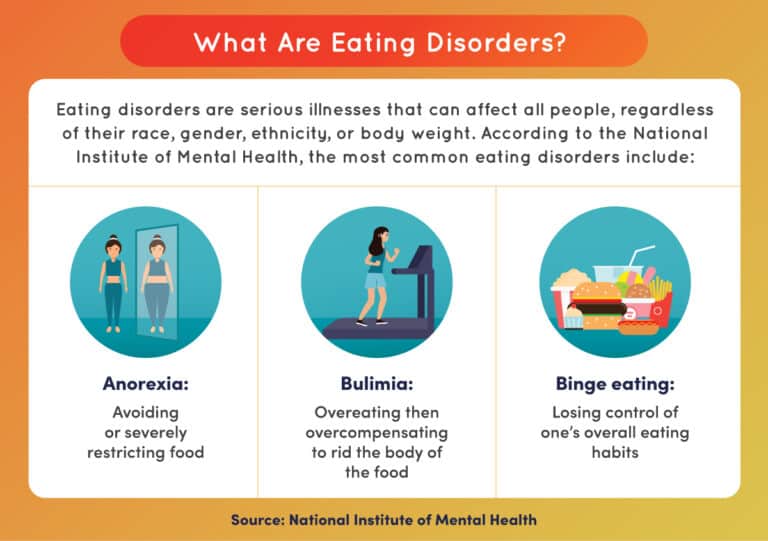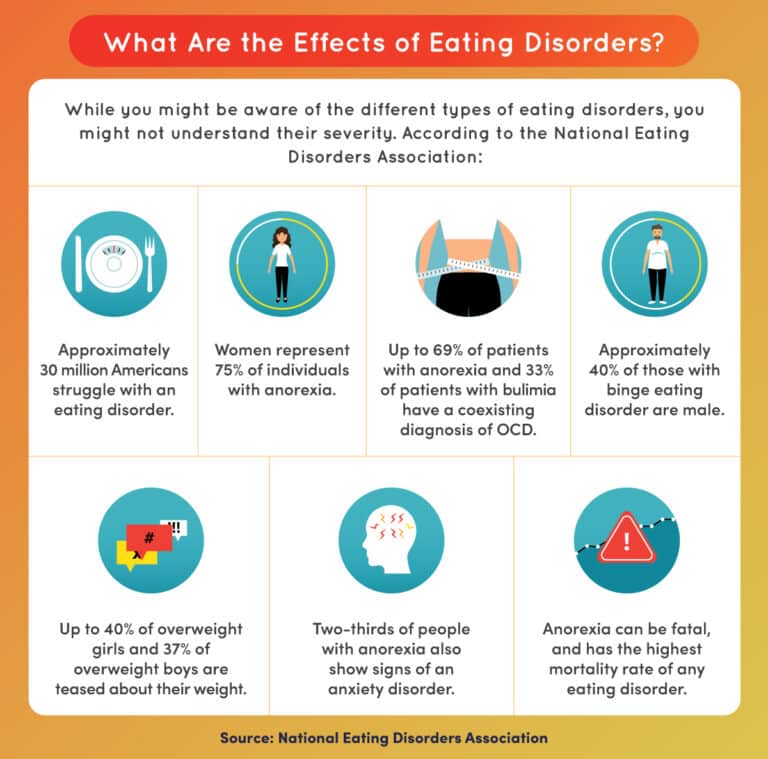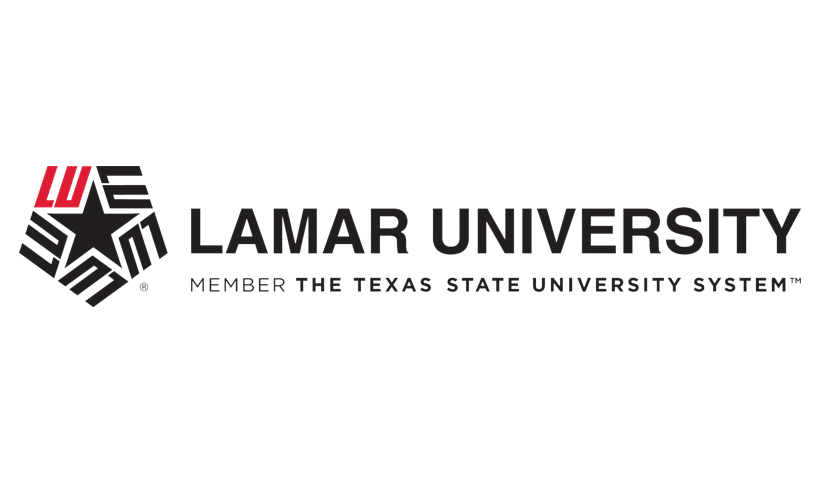Eating disorder graduate programs are designed to provide students with the skills they’ll need to treat patients with anorexia nervosa, bulimia nervosa, and binge eating disorders. The root cause of many eating disorders can be mental disorders, such as body dysmorphia, or negative life experiences. Some people engage in disordered eating because of past trauma, difficult experiences in relationships, or even bullying.
If you are considering a career in therapy, clinical psychology, or counseling, the master’s in counseling and subsequent counseling licensure is the likely route to helping your target population. As a graduate in this field, you’ll work with people as they address the underlying psychological issues that lead to eating-related struggles.
 Walden University : MS in Clinical Mental Health Counseling (CACREP Accredited, six specializations to choose from)
Walden University : MS in Clinical Mental Health Counseling (CACREP Accredited, six specializations to choose from) Walden University : MS in School Counseling (CACREP Accredited)
Walden University : MS in School Counseling (CACREP Accredited) Northwestern University : Online MA in Counseling (CACREP Accredited)
Northwestern University : Online MA in Counseling (CACREP Accredited) Northwestern University : Master of Science in Marriage and Family Therapy (Complete your COAMFTE-accredited MFT online program in as few as 21 months. No GRE required.)
Northwestern University : Master of Science in Marriage and Family Therapy (Complete your COAMFTE-accredited MFT online program in as few as 21 months. No GRE required.) Grand Canyon University : Master's Degree in Counseling (CACREP Accredited)
Grand Canyon University : Master's Degree in Counseling (CACREP Accredited) Liberty University : MA: Clinical Mental Health Counseling (Online with required intensives)
Liberty University : MA: Clinical Mental Health Counseling (Online with required intensives) National University : Master of Science in Clinical Mental Health Counseling (Accredited. No GRE. Scholarships Available)
National University : Master of Science in Clinical Mental Health Counseling (Accredited. No GRE. Scholarships Available) University of Denver : Master of Arts in School Counseling (CACREP Accredited)
University of Denver : Master of Arts in School Counseling (CACREP Accredited) Mid-America Christian University (MACU) : Master of Science (MS) in Counseling (100% Online, No GRE Required)
Mid-America Christian University (MACU) : Master of Science (MS) in Counseling (100% Online, No GRE Required)What Is Eating Disorder Therapy Counseling?
What takes place during eating disorder therapy depends on a person’s specific eating disorder and symptoms. Licensed counselors can work with individuals who present with a wide range of psychological symptoms. However, in eating disorder therapy, counselors target a person’s disordered eating habits with the goal of changing them, in order to increase their physical and mental health.
In addition to experience-related disorders, some people diagnosed with an eating disorder may have an additional diagnosis such as body dysmorphic disorder or obsessive-compulsive disorder. Counselors who work specifically with clients with eating disorders may begin their treatment by identifying the root diagnosis responsible for this symptomatic eating issue. So how do individuals become eating disorder therapists, counselors, specialists, and clinical psychologists?
Eating Disorder Training for Therapists
Through academic training and internships, aspiring eating disorder counselors, therapists, specialists, and clinical psychologists can learn about the different types of therapies available for use in this area of counseling. Some common forms of therapy employed by eating disorder therapists include cognitive behavioral therapy (CBT) and family therapy.
Those working with individuals with eating disorders seek to create an environment conducive to healing and change. In most cases, therapists in this field work with both the client and their family to ensure lasting change.
Professional counselors in this field primarily work with teenage and adult clients who have sought treatment for active eating disorders. They typically work in generalized counseling centers, schools, and private practices. Gaining hands-on experience in the field through on-the-job training prepares individuals to become effective eating disorder therapists and counselors.
Consider a Featured Online Counseling Program
| School and Program Information | Online Program? Entry Requirements | Course Information | |
|---|---|---|---|
|
Walden University
MS in Clinical Mental Health Counseling
 CACREP Accredited CACREP Accredited |
✔ Online
GRE scores not required
|
Walden’s online CACREP-accredited MS in Clinical Mental Health Counseling program can help you become the competent, compassionate counselor you know you can be.
|
Learn More |
|
Walden University
MS in School Counseling
 CACREP Accredited CACREP Accredited |
✔ Online
GRE scores not required
|
CACREP-accredited program provides a solid foundation in school counseling theories, approaches, and best practices while enabling you to gain hands-on experience.
|
Learn More |
|
Northwestern University
Online MA in Counseling
 CACREP Accredited CACREP Accredited |
✔ Online
GRE Not Required
Bachelor's Required |
CACREP-accredited online Master of Arts in Counseling from The Family Institute at Northwestern University. Prepare to pursue licensure in as few as 18 months.
|
Learn More |
|
Northwestern University
Master of Science in Marriage and Family Therapy
COAMFTE Accredited
|
✔ Online
GRE Not Required
Bachelor's Required |
Complete your COAMFTE-accredited MFT online program in as few as 21 months. No GRE required.
|
Learn More |
|
Grand Canyon University
Master's Degree in Counseling
 CACREP Accredited CACREP Accredited |
✔ Online
|
CACREP-accredited MS in Clinical Mental Health Counseling. Emphases: Marriage & Family Therapy, Christian Counseling, Childhood & Adolescence Disorders, & Trauma.
|
Learn More |
|
Liberty University
MA: Clinical Mental Health Counseling
 CACREP Accredited CACREP Accredited |
✔ Online
Online with required intensives
|
Our CACREP-accredited online master’s in counseling helps you become a skilled mental health counselor ready to empower others for positive change.
|
Learn More |
|
National University
Master of Science in Clinical Mental Health Counseling
WSCUC Accredited
|
✔ Online
GRE Scores Not Required
|
Focused on training highly skilled counselors to provide impactful and culturally sensitive mental health services in their communities.
|
Learn More |
|
University of Denver
Master of Arts in School Counseling
 CACREP Accredited CACREP Accredited |
✔ Online
No GRE Required; Minimum GPA 2.5 Required
|
With no GRE required, earn your CACREP-accredited Master's in School Counseling online in as few as 24 months from the University of Denver.
|
Learn More |
|
Mid-America Christian University (MACU)
Master of Science (MS) in Counseling
Higher Learning Commission (HLC)
|
✔ Online
100% Online
|
Oklahoma’s largest MS in Counseling program, with emphases in addiction and substance abuse, applied behavioral science, clinical mental health counseling, and more!
|
Learn More |
*Sponsored Counseling Programs
For detailed degree information, view the guides to:
Online CACREP Accredited programs | Online MPCAC Accredited programs
What Eating Disorder Graduate Programs Are Available?
If you are considering a career as an eating disorder therapy professional, you’ll want to learn more about the educational path to this career. Numerous degree programs exist that can send you on your way. The following eating disorder graduate programs are available for you:
Bachelor’s in Counseling or Psychology
To become a licensed eating disorder counselor, you first must earn a bachelor’s degree. Most students choose majors such as psychology, counseling, or social work for their undergraduate degree since each of these can provide the necessary knowledge for a career in counseling.
Most bachelor’s degree programs take about four years to complete and include introductory courses in algebra, English, and history. Degree-specific courses can focus on research methods, cognition, and counseling. Many bachelor’s degree programs also offer concentrations, such as Clinical Psychology, Human Performance Psychology, Counseling, or Rehabilitation.
Master’s in Counseling
The most common degree level for those who want to become eating disorder specialists or counselors is the master’s degree. Indeed, at minimum, individuals must possess a master’s degree to be eligible for licensure in their state, and their graduate program must meet accreditation requirements.
The master’s in counseling degree can take two to three years to complete — depending on enrollment status — and includes courses that are specific to administering counseling techniques to clients in the field. This degree level is the most popular for licensed counselors.
Doctor of Counseling
Those wanting to pursue higher education pertaining to mental illness and counseling should consider doctoral-level programs designed to deepen understanding of these subjects. Doctoral programs in counseling can provide knowledge relevant to research, leadership, and advanced clinical understanding in the field.
Why Choose an Online Eating Disorder Graduate Program?
A master’s degree is the minimum qualification for licensure in the field of counseling. Consequently, attending an eating disorder graduate program is often the end goal for those pursuing careers in the field. Many master’s degree programs have online formats, which can be a huge advantage for busy students looking to transform their careers.
Students enrolled in an online master’s in counseling participate in discussions with instructors and classmates regarding different topics assigned each week. These virtual experiences can help students identify secondary viewpoints on important counseling techniques and mental disorders, which promote critical thinking skills and professional development in the field.
As part of the online degree experience, students may also be required to perform independent research on various counseling topics. If you are the type of person who thrives on completing independent coursework, online programs may be the right option for you. Instructors in remote courses are equipped with the skills and tools required to be supportive resources for students, making online options great for a wide variety of learning styles.
CACREP Accredited Programs
Online Master’s in Counseling programs being offered across the U.S. can provide learners with the same level of quality as traditional offerings, all while being conducted in the virtual environment. Online degree programs at this level can also received accreditation from the Council for Accreditation of Counseling and Related Educational Programs (CACREP), which is the leading accreditation agency for counseling programs.
During your experience in an online Master’s of Counseling, you can engage in discussions with your instructor and classmates regarding different topics assigned each week. These experiences can help you identify secondary viewpoints on important counseling techniques and mental disorders, which can help you think critically and constructively as a professional in the field.
As part of your online degree experience, you may also be required to perform independent research on various counseling topics. All assignments in the virtual classroom are submitted through an embedded drop box tool within the online classroom.
If you are the type of person that flourishes in independent course work, online programs may be the right option for you. Instructors in these courses are equipped with the skills and tools required to be supportive resources to students enrolled, making online options great for a wide variety of learning styles.
 Walden University - MS in Clinical Mental Health Counseling (CACREP Accredited)
Walden University - MS in Clinical Mental Health Counseling (CACREP Accredited)
 Walden University - MS in School Counseling (CACREP Accredited)
Walden University - MS in School Counseling (CACREP Accredited)
 Northwestern University - Online MA in Counseling (CACREP Accredited)
Northwestern University - Online MA in Counseling (CACREP Accredited)
 Northwestern University - Master of Science in Marriage and Family Therapy (COAMFTE Accredited)
Northwestern University - Master of Science in Marriage and Family Therapy (COAMFTE Accredited)
 Grand Canyon University - Master's Degree in Counseling (CACREP Accredited)
Grand Canyon University - Master's Degree in Counseling (CACREP Accredited)
 Liberty University - MA: Clinical Mental Health Counseling (CACREP Accredited)
Liberty University - MA: Clinical Mental Health Counseling (CACREP Accredited)
 National University - Master of Science in Clinical Mental Health Counseling (WSCUC Accredited)
National University - Master of Science in Clinical Mental Health Counseling (WSCUC Accredited)
 University of Denver - Master of Arts in School Counseling (CACREP Accredited)
University of Denver - Master of Arts in School Counseling (CACREP Accredited)
 Mid-America Christian University (MACU) - Master of Science (MS) in Counseling (Higher Learning Commission (HLC) Accredited)
Mid-America Christian University (MACU) - Master of Science (MS) in Counseling (Higher Learning Commission (HLC) Accredited)

Eating Disorder Counseling Certification
While a master’s degree in counseling, such as one offered through an eating disorder graduate program, is the minimum requirement for professionals interested in working with clients managing life with an eating disorder, certificate programs are also available to help counselors focus on the specific needs of clients with these presentations.
Additionally, earning a certificate can make individuals more competitive in the field. The International Association of Eating Disorders Professionals offers the following certifications:
- Certified Eating Disorders Specialist (CEDS)
- Registered Dietitian (CEDRD)
- Certified Eating Disorder Registered Nurse (CEDRN)
- Creative Arts Therapist (CAT)
One of the most popular ways for aspiring eating disorder therapy professionals to develop their skills is to participate in an internship. An internship or supervised work experience is a requirement for licensing in all 50 states.
Eating Disorder Specialist Degree Programs
Finding a quality eating disorder graduate program to set you on the path to becoming a licensed eating disorder specialist requires time and consideration. To become a licensed therapist, individuals most likely need to graduate from a program that has received CACREP accreditation.
Antioch University offers a master’s degree program that is currently accredited by CACREP. Antioch offers an online master’s in mental health counseling that can be completed by most students in about two years.
The Antioch program provides students with a high-quality curriculum that can prepare them for the licensure examination and to work with individual clients in the field. Graduates of bachelor’s programs related to psychology and mental health are encouraged to apply.
Bellevue University is another current provider of an online and accredited master’s in mental health counseling degree program. Students enrolled in this program can complete their degree in about two years through the online course room.
Since both of these programs are accredited, graduates can utilize their degrees during the licensure process. The curriculum in each program focuses on topics relevant to future therapeutic professionals in the field, such as trauma, crisis, and traumatic stress counseling; treatment of child and adolescent disorders; and advanced counseling skills, techniques, and practices.
Sample Courses in an Eating Disorder Graduate Program
Eating disorders can have both short-term and long-term negative effects on a person’s physical and mental health. To be fully prepared to treat clients, counselors should have a solid understanding of how to diagnose different types of eating disorders.
If you are interested in learning how to become an eating disorder counselor or how to become an eating disorder therapist, you’ll want to establish a full understanding of the following:
Psychopathology
Graduate students can take courses such as Psychopathology: Diagnosis and Assessment to help them recognize the common symptoms and presentations of common and uncommon mental health disorders.
This course can provide practice in assessing the presenting symptoms of clients and test students on their knowledge of different mental health disorders. For eating disorder therapy professionals, recognizing these symptoms during the initial interview process can be vitally important.
Counseling Theories
Counseling Theories is another common course in a master’s in counseling degree program. As a counseling student, you’ll learn about the development and evolution of counseling techniques over time, as well as the effectiveness of methods in use today.
Assessment Methods
The course Assessment Methods outlines specific steps to take to ensure that you have properly evaluated your client so that an accurate diagnosis can be made. Each step in the therapeutic process can be utilized with clients with a wide range of presenting symptoms.
The curriculum in this program was designed to help professionals make accurate assumptions about a client’s mental health, develop a relevant treatment plan for the diagnosis, and provide continued services as the client moves through the healing process.
How to Become an Eating Disorder Specialist
If you are interested in learning more about how to become an eating disorder counselor or how to become an eating disorder specialist, consider taking the following steps:
Step #1: Earn Your Bachelor’s Degree
First, you want to explore different bachelor’s-level programs that can set you on track for licensure. Most master’s programs recommend that you complete an online or traditional bachelor’s in psychology or counseling since they focus directly on the knowledge you’ll need to work in this field.
Step #2: Take the GRE
Completion of a bachelor’s degree in either psychology or counseling can qualify graduates for entry-level support positions if they plan to work while pursuing a master’s degree. Completing the Graduate Record Examination (GRE) to satisfy an admission requirement for master’s programs may be beneficial for some students. Many universities require GRE scores during the application process.
Step #3: Earn Your Master’s Degree
Selecting an eating disorder graduate program should be the next step toward your career goal. Be sure to choose a college program that is accredited by the CACREP, since most states require this type of accreditation during the licensing process.
Step #4: Gain Clinical Experience
Working under the supervision of an eating disorder therapist enables students to observe the process of assessing and counseling clients specific to their field of interest. This component of the licensure requirements can take anywhere from two to three years to complete and provides valuable knowledge and expertise for entering into this treatment field.
The two to three year supervision component can be a direct prerequisite for licensure in your state. The process of licensure involves applying with your state’s licensing division, completing a board examination for counselors, and submitting all relevant documentation pertaining to your education, training, and testing.

Eating Disorder Therapy Counseling Resources
As you begin your career in eating disorder therapy, joining organizations dedicated to supporting professional counselors can be helpful. The American Counseling Association (ACA) is one of the largest counseling organizations for professionals in this field.
By becoming an ACA member you’ll have access to current research and trends in the field, the opportunity to attend meetings and professional gatherings for counselors, and the chance to network with other licensed counselors. ACA membership could prove especially beneficial to new therapists starting out in the field.
National Association of Anorexia Nervosa and Associated Disorders
The National Association of Anorexia Nervosa and Associated Disorders seeks to treat disordered eating through the use of effective practices by qualified individuals. This nonprofit organization exists to help those suffering from eating disorders. Counselors can volunteer to be mentors or group leaders for individuals going through the process of recovery.
As a member, you’ll connect with therapists dedicated to helping individuals with this disorder, as well as people that have recovered from eating disorders and are reaching out to help others. Connecting with this group could provide you with even more knowledge about this important subject area in health care.
National Eating Disorders Association
The National Eating Disorders Association is a large organization with a wide network that seeks to help obese people and those with eating disorders. Many counselors starting their careers join professional organizations to learn more about their treatment area and connect with other professionals in the field. If you are seeking support as a new or aspiring counselor, you are encouraged to find professional organizations that fit your needs.
Eating Disorder Counselor Career Options
Some students enter college with a career already in mind. They understand how influential eating disorder therapy professionals can be in the lives of people who are struggling to find hope after being diagnosed with an eating disorder. However, what exactly are the career options available to individuals after graduating from an eating disorder graduate program?
Career #1: Eating Disorder Therapist
Professionals can work in general counseling practices that typically provide counselors versed in a wide range of specialty areas. Patients seeking mental health guidance or looking for specific treatment may begin their search in the general counseling center before getting help from a therapist.
An individual wondering how to become an eating disorder therapist may want to know how much someone in this occupation earns. According to PayScale, eating disorder therapists had a median annual salary of about $43,000 as of November 2020.
Career #2: Eating Disorder Counselor
Eating disorders can be prevalent in high school settings, so counselors in this field may work through school systems or in teen treatment centers. Counselors are encouraged to work for employers that serve the age group most affected by their treatment specialty.
An individual wondering how to become an eating disorder counselor may be curious how much they can expect to earn. According to the U.S. Bureau of Labor Statistics (BLS), substance abuse, behavioral disorder, and mental health counselors — including eating disorder counselors — earned a median annual salary of $46,240, as of May 2019.
Career #3: Clinical Psychologist
Professionals who complete a bachelor’s and master’s degree and receive licensure can work in a private practice. With your degree in counseling, you can work as a clinical psychologist and provide care to a wide range of clients, including those with eating disorders. A career in clinical psychology yields many benefits for both clients and psychologists. These professionals have the ability to diagnose and treat patients who are struggling with disordered eating, conduct research on behavioral patterns, and contribute new findings to the field.
Clinical psychologists can be self-employed or can work in schools, government organizations, or hospitals. The median annual salary for clinical psychologists was $78,200 in May 2019, according to the BLS.
Earn an Eating Disorder Graduate Degree
Attending an eating disorder graduate program and earning an advanced degree can prepare you for a rewarding and versatile career. Learn more about how different bachelor’s and master’s counseling degree programs can help you reach your goals as an eating disorder therapist, counselor, specialist, or clinical psychologist.







